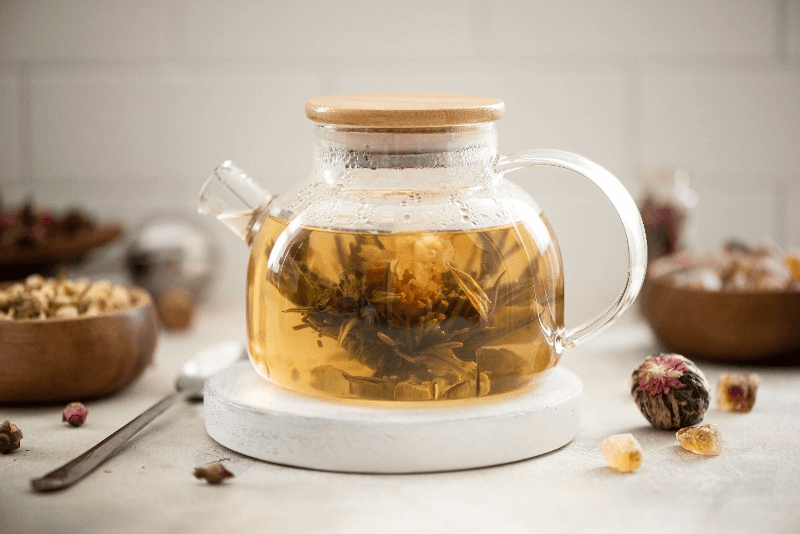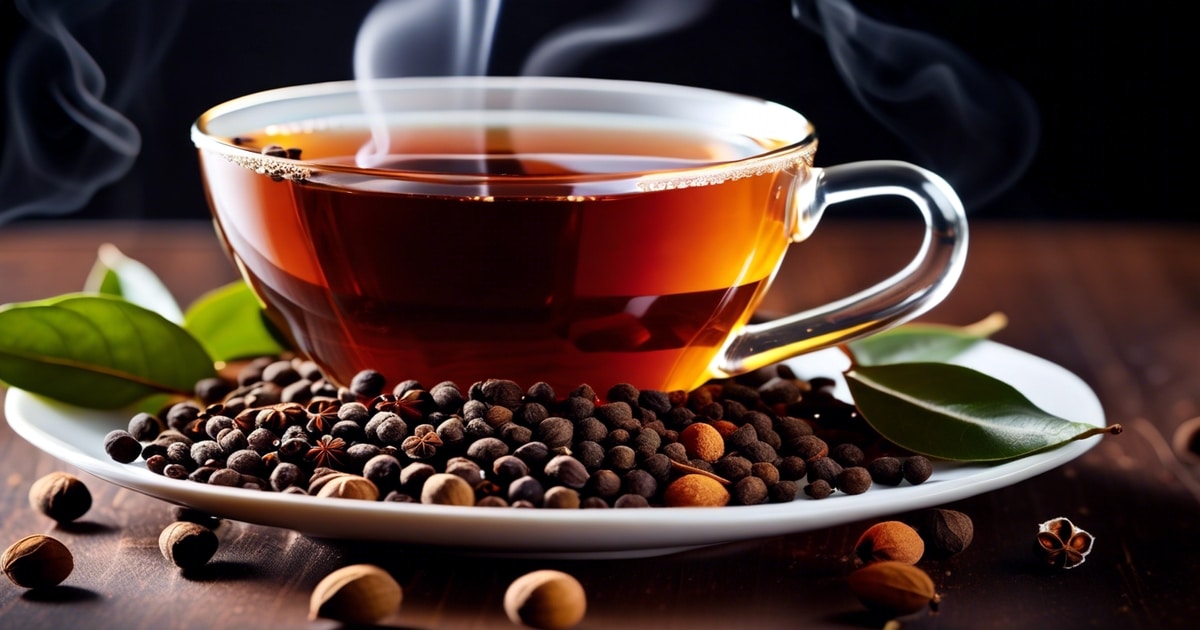Key Takeaways
-
Allspice is a versatile spice with numerous health benefits, including its rich nutritional profile, powerful antioxidant properties, and plant compounds.
-
Incorporating allspice and different spices into your diet can support your immune system and promote cardiovascular health due to its antimicrobial, anti-inflammatory, and vasodilatory effects.
-
For those experiencing digestive issues or seeking dental health, allspice, and cinnamon, as medicinal plants, can offer relief and support due to their carminative and antibacterial properties.
-
Women in menopause or experiencing menstrual discomfort may find relief by incorporating allspice and other spices into their recipes, as it has been traditionally used for managing menopausal symptoms and providing menstrual relief.
-
While allspice offers various health benefits, it’s essential to understand the potential risks associated with its consumption, particularly in large amounts, to ensure safe and moderate usage.
-
Consider incorporating allspice and spices into your food through teas, desserts, or savory dishes to experience their wide-ranging health benefits.
Allspice tea is more than just a warm, comforting beverage with spices and flavor. Allspice tea is good for your health because it has many antioxidants and can help reduce inflammation. It can help with digestion, boost your immune system, and even help with menstrual cramps. It’s also good for keeping your blood sugar levels in check. This drink can make you feel better and be a part of your healthy habits.
Nutritional Profile of Allspice
Essential Nutrients
Allspice offers a range of nutrients that are beneficial for overall health. It is rich in manganese, a single substance that supports the body’s metabolism and helps maintain healthy bones. Allspice contains iron and calcium, essential minerals for transporting oxygen throughout the body and contributing to bone health.
Vitamins and Fiber
In addition to minerals, allspice also provides important vitamins. It contains vitamins A and C, which support the immune system and overall well-being. Vitamin A is essential for good vision, while vitamin C acts as an antioxidant, protecting cells from damage. Furthermore, allspice is a good source of dietary fiber, promoting healthy digestion by aiding in regular bowel movements and preventing constipation.
All these nutritional components make allspice tea a flavorful beverage with added health benefits. By incorporating this aromatic spice into your diet through tea consumption, you can enjoy its unique flavor profile while reaping its nutritional advantages.
Antioxidant Powerhouse in Allspice

Potent Antioxidant Properties
Allspice, also known as pimento, is packed with a high content of phenolic compounds, making it an impressive antioxidant. These antioxidants are crucial in combating oxidative stress and reducing the risk of chronic diseases. Think of Allspice as a superhero that fights off harmful molecules called free radicals.
Allspice’s antioxidant power isn’t just limited to fighting diseases; it also contributes to skin health, anti-aging benefits, and view. By consuming allspice, you’re giving your body ammunition to combat the effects of aging and maintain healthy, glowing skin.
Skin Health and Anti-Aging Benefits
The antioxidants in allspice help protect the skin from damage caused by free radicals. This protection can improve overall skin health, preventing wrinkles, fine lines, age spots, and spice. Incorporating allspice into your diet or skincare routine can promote collagen production, essential for maintaining youthful-looking skin.
Incorporating allspice into various recipes like pumpkin pie or mulled wine enhances the flavor and provides an easy way to reap its antioxidant benefits. With its unique flavor profile reminiscent of a blend of cinnamon, nutmeg, and cloves combined into one single spice, allspice is a versatile ingredient that offers culinary delight and health advantages.
Allspice for Immune System Support
Vitamin C Boosts Immune System
Allspice tea contains vitamin C, essential for a healthy immune system. This vitamin’s presence in allspice strengthens the body’s defense against illnesses. By consuming allspice tea, individuals can help their immune system function optimally.
The antimicrobial properties of allspice tea play a crucial role in supporting the immune system. These properties aid in fighting off infections and promoting overall immunity. Regular consumption of allspice tea can assist in maintaining a strong and resilient immune system, reducing the risk of falling ill frequently.
Overall Immune Resilience
The consumption of allspice tea offers various benefits, contributing to overall immune resilience. Its antioxidant content further supports the body’s defense mechanisms. This helps protect the body from oxidative stress and illness-causing agents, ultimately bolstering the immune system.
Cardiovascular Health and Allspice

Blood Pressure Regulation
Allspice can help regulate blood pressure levels, which is crucial for cardiovascular health. The compounds in allspice, such as eugenol, contribute to this benefit. By supporting healthy blood pressure, allspice promotes optimal circulation throughout the body.
Allspice’s ability to regulate blood pressure is essential for maintaining a healthy cardiovascular system. When blood pressure is managed effectively, it reduces the strain on the heart and lowers the risk of developing heart-related conditions.
Anti-inflammatory Properties
The anti-inflammatory properties of allspice play a significant role in reducing the risk of cardiovascular diseases. Chronic inflammation can lead to various heart issues, but consuming allspice may help mitigate these risks by combating inflammation within the body.
Allspice’s Antimicrobial and Anti-inflammatory Effects
Antimicrobial Properties
Allspice, a potent plant extract, possesses remarkable antimicrobial properties that can combat various bacteria and fungi. This natural remedy, spice, has been studied for its ability to inhibit the growth of harmful microorganisms, making it an effective option for addressing infections. For example, research suggests that allspice may help fight off bacterial strains such as E. coli and Salmonella.
Moreover, eugenol in allspice contributes significantly to its antimicrobial effects. Eugenol is a powerful compound in various plant essential oils known for its antibacterial and antifungal properties. Allspice becomes an excellent resource for promoting overall health by harnessing this natural component to ward off microbial threats.
Anti-inflammatory Effects
The eugenol compound present in allspice also plays a pivotal role in conferring anti-inflammatory benefits. Its ability to reduce inflammation makes it particularly valuable for individuals suffering from arthritis or other inflammatory ailments. By incorporating allspice into one’s diet or consuming medicinal plants containing eugenol, individuals may experience relief from symptoms associated with inflammation.
Incorporating allspice into one’s daily routine can be beneficial due to its distinctive flavor and the significant health advantages it offers through its antimicrobial and anti-inflammatory properties.
Digestive and Dental Health with Allspice
Gut Health Benefits
Allspice offers significant benefits for digestive health, promoting a healthy gut and reducing bloating. Its carminative properties effectively alleviate gas and indigestion, providing relief for individuals experiencing discomfort after meals. The consumption of allspice can help regulate bowel movements, supporting overall digestive function.
The eugenol content in allspice contributes to its potential dental health benefits. This stuff fights mouth germs and can help prevent cavities and gum problems. Eating it or using it in natural remedies might help your stomach and keep your mouth healthy.
Culinary Uses and Application
Allspice is used in folk medicine for health benefits and in baking and cooking for its warm flavor. It’s like a mix of cinnamon, nutmeg, and cloves. It can make food smell and taste better while being good for you.
Allspice in Menopause Management and Menstrual Relief
Natural Remedy
Allspice, with its analgesic properties, has the potential to offer relief from menstrual cramps. Its natural remedy could assist in managing menopausal symptoms such as muscle aches and pains. Consuming allspice tea might help alleviate discomfort during menstruation, providing a natural alternative to over-the-counter medications.
Allspice’s analgesic properties make it an attractive option for women seeking relief from menstrual cramps without resorting to pharmaceutical pain relievers. Its potential benefits in managing menopausal symptoms can provide a holistic approach to addressing the various discomforts associated with this stage of life.
Health Benefits
Drinking allspice tea can help with period and menopause pain. It’s a natural option for people who don’t want to rely only on medicine. Also, it’s good for digestion and keeping teeth healthy.
-
Natural remedy for menstrual cramps
-
Potential assistance in managing menopausal symptoms
-
Alleviation of discomfort during menstruation
Understanding Potential Risks of Allspice Consumption
Adverse Effects
Consuming allspice in excessive amounts can lead to adverse effects such as nausea or vomiting. Using allspice in moderation is important, especially for its potential health benefits. While small amounts of allspice may be beneficial, overconsumption can result in unpleasant side effects that may outweigh the positive aspects.
Allergic Reactions
Some individuals may experience allergic reactions to allspice, so caution is necessary. Allergies to food items like allspice are not uncommon and can manifest as skin rashes, itching, or even more severe symptoms like difficulty breathing. Therefore, it’s crucial for individuals with known allergies or sensitivities to spices to consult a healthcare professional before incorporating allspice into their diet.
Interference with Medications and Medical Conditions
High doses of allspice could interfere with certain medications or exacerbate existing medical conditions. It’s essential for individuals taking medications regularly or managing specific health issues to be aware of the potential interactions between allspice and their prescribed drugs. Consulting a healthcare provider before using allspice supplements is advisable, especially if someone has underlying health concerns.
Summary
The nutritional profile of allspice reveals its rich array of essential vitamins and minerals, making it a valuable addition to a balanced diet. Its potent antioxidant properties contribute to immune system support and cardiovascular health while exhibiting antimicrobial and anti-inflammatory effects. Allspice offers digestive and dental health benefits and potential relief during menopause and menstrual discomfort.
However, understanding the potential risks associated with its consumption is crucial. To reap the benefits of allspice, individuals are encouraged to incorporate it into their diet in moderation and consult with a healthcare professional if they have any underlying health concerns.
Frequently Asked Questions
Is allspice tea beneficial for boosting the immune system?
Allspice tea contains antioxidants and compounds that support the immune system. Its antimicrobial properties can help fight off infections, making it a beneficial addition to your diet.
Can allspice aid in managing menopausal symptoms and providing menstrual relief?
Yes, allspice has been traditionally used for managing menopausal symptoms and providing relief during menstruation due to its anti-inflammatory properties. However, it’s essential to consult with a healthcare professional before using it.
Are there any potential risks associated with consuming allspice?
While allspice offers numerous health benefits, excessive consumption may lead to adverse effects such as digestive issues or allergic reactions in some individuals. Moderation is key when incorporating it into your diet.
How does allspice contribute to cardiovascular health?
The antioxidant compounds present in allspice can help promote heart health by reducing oxidative stress and inflammation. Its potential ability to regulate blood pressure further supports cardiovascular well-being.
Does Allspice offer benefits for digestive and dental health?
Allspice possesses carminative properties that aid digestion and can also act as an antiseptic for oral health. It may help alleviate digestive discomfort while contributing to overall dental hygiene when used judiciously.

